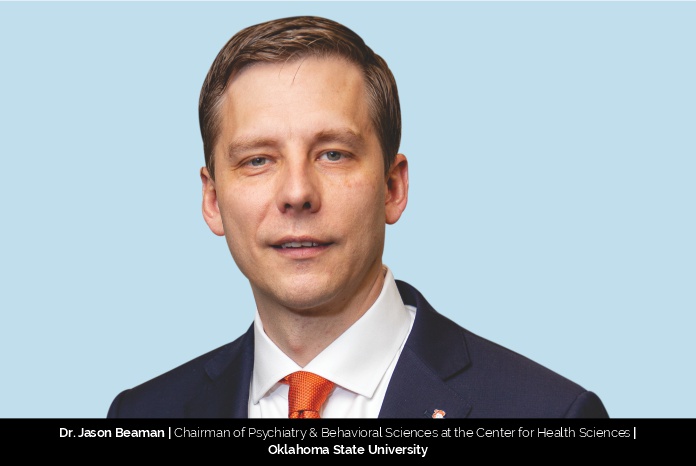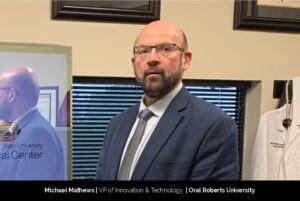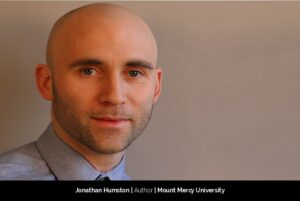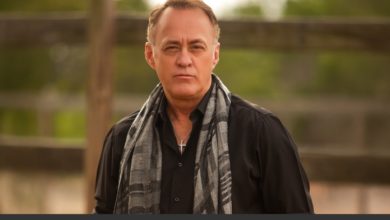Dr. Jason Beaman: An Addiction Specialist Driving Change in Oklahoman Lives
Beyond’s Top Influential Educational Experts Making a Difference, 2020

From 1999–2018, almost 450,000 people died from an overdose
involving any opioid, including prescription and illicit opioids. This increase
in opioid overdose deaths can be outlined in three distinct waves. The first
wave started with increased prescribing of opioids in the 1990s, with overdose
deaths involving prescription opioids (natural and semi-synthetic
opioids and methadone) rising since at least 1999. The second wave began in
2010, with rapid growth in overdose deaths involving heroin. The third
wave started in 2013, with substantial increases in overdose deaths including
synthetic opioids, particularly those involving illicitly
manufactured fentanyl.
In the U.S., there were 67,367 drug overdose deaths reported
in 2018. Opioids were involved in 46,802 overdose deaths in 2018—nearly 70% of
all overdose deaths. In Oklahoma, an estimated 43% of drug overdose deaths
involved opioids in 2018 totaling more than 308 fatalities. Among
opioid-involved deaths, those involving heroin or synthetic opioids other than
methadone (mainly fentanyl and fentanyl analogs) remained steady with a
respective 84 and 79 deaths reported in 2018. The opioid crisis is real for
Oklahomans, and Dr. Jason Beaman understands this very well. He has been
at the forefront of fighting a battle to combat the crisis for a long time.
Serving as the Chair of Psychiatry and Behavioral Sciences at Oklahoma State
University Center for Health Sciences, as well as the Director of Training and
Education for the National Center for Wellness & Recovery at OSU Medicine
and Medical Director for 12&12, Inc., Dr. Beaman wants to give back to
society by helping people with addiction. This is his story!
Training the next generation is an ethical obligation
Growing up, Dr. Beaman wanted to be an archeologist, but it changed
when he realized Indiana Jones was not real, he humorously recalls. He went
into medicine to help people and particularly psychiatry, because he believes to
this day, “It is the biggest bang for your buck – able to help people
dramatically with very little cost”. And his journey began. He graduated
medical school from Oklahoma State University Center for Health
Sciences. He then completed two simultaneous residencies in Psychiatry and
Family Medicine. After residency, Dr. Beaman completed a fellowship in Forensic
Psychiatry at Case Western Reserve University in Cleveland, Ohio. He holds
board certifications in Family Medicine, Psychiatry, Forensic Psychiatry and
Addiction Medicine. After fellowship, Dr. Beaman completed a master’s degree in
Pharmacology with an emphasis in Forensics at the University of Florida. He
also obtained a Master’s in Public Health from Johns Hopkins University. “I
think it’s an ethical obligation of every physician to train the next
generation – which carries on one of the foundational principles of
Hippocrates. Teaching future physicians and other professionals provides me the
most enjoyment,” Dr. Beaman says of his motivation to educate future
physicians.
Dr. Beaman’s experience in family medicine, psychiatry,
forensic psychiatry and addiction medicine all converge to provide insight into
the opioid epidemic. So, in his role as chair of psychiatry, he has been very
involved in trying to save lives in Oklahoma. He says one of the unique
challenges of the opioid epidemic is that you really can’t talk about just
opioid prescribing without talking about how you appropriately and effectively
treat pain. “So, I got involved in opioid litigation through my forensic
psychiatry role and my expertise in addiction. It all just kind of wrapped up
as a perfect storm as Oklahoma was one of the first states in the country to
file the nuisance claim against the pharmaceutical manufacturers,” he said.
Marketing campaigns of companies is the reason the
crisis exists
Dr. Beaman strongly believes the opioid crisis in Oklahoma
is real, and it is not confined to any particular demographic. “It is
killing the rich and the poor alike, urban and rural dwellers, and men and
women regardless of their politics, career choice or insurance status,” he
says. Therefore, when Dr. Beaman was testified in Oklahoma Opioid Trial last
year, he had said J&J is largely responsible for the opioid crisis. Dr. Beaman
says one of the important ways to getting this epidemic under control is to
stop pharmaceutical companies and market opioids in a better, safer way. He
said he believes the marketing campaigns of companies is the reason the crisis
exists. “You don’t heal the healthy, you have to go to where people need the
help the most, and I feel like that’s Oklahoma,” he further added. “These
are my people, this is my state. I feel quite a bit of obligation and
responsibility and duty in coming back here and caring for Oklahomans,” he
had said.
Research, Clinical Services, Advocacy, and Education
At the National Center for Wellness & Recovery
at OSU Medicine, Dr. Beaman and his team provide comprehensive care for those
suffering from addiction while advancing treatment through education, research
and policy. The center is designed to have four major pillars of research,
clinical services, advocacy and education. “We know it’s going to take concerted
effort in all four of those areas to get Oklahoma out of the throes of the
opioid epidemic and really put a dent in the addiction burden that we have. The
center is largely geared toward opioid addiction but then also toward
evidence-based treatments for pain. One of our major areas of focus is research
from the bench level all the way up to the public health model. So, we start
with a molecule and would eventually end up studying the effects of that
molecule on the population as a whole and every step in between,” he
shares.
Dr. Beaman says that he sees mental health of Oklahoma as an
academic chair. For him, it is his responsibility. So, when he was first
practicing in Oklahoma four years ago, he realized “you can’t even begin to
talk about improving mental health unless you get a handle on the opioid
addiction. So, I started kind of aggressively putting together a public health
framework working with our different state agencies on what would be available
to start monitoring at a very fine level opioid prescriptions and high-volume
prescribers. I pushed out extensive education on the proper use of opioids, the
danger of opioids and appropriate frame management. And we have seen a dramatic
decrease in opioid prescriptions.” Twenty-nine percent decrease over the
last few years. “But I can’t just come and tell you there’s a problem right
and doctors don’t respond very well when you say stop prescribing opioids. So,
I feel we must come up with solutions and appropriate non-opioid based
recommendations for pain management and really try to assist those doctors. Because
it is a very difficult job that they have right now shifting back to the blood
samples from clinical trials and having access obviously can help investigate
genetic pathways that drive pain and addiction,” he further adds.
Improving the process of transferring psychiatric
patients
As the Chair of Department of Psychiatry and Behavioral
Sciences at the OSU Center for Health Sciences, Dr. Beaman provides
undergraduate medical education, residency programs, research and patient
care. One of Dr. Beaman’s successful projects has been the Project Blue Streets
protocol. The protocol is focused on improving the process of transferring
psychiatric patients into an appropriate setting in an emergency situation in
Tulsa; it was developed by the Project Blue Streets Task force, which gathered
information and obtained stakeholder input to develop the protocol. The goal of
the protocol is to provide mental health treatment facilities and emergency
departments a common standard of efficient and evidence-based recommendations
to better care for persons with psychiatric disorders, including emergency
custody, voluntary and involuntary civil admissions.
Continue to find ways to
connect with our friends and loved ones
Dr. Beaman says starting
in the 1980s, the major pharmaceutical companies began a ploy to change the way
physicians and patients think about addicting medications and addiction. This
has spilled over into recreational drugs and a thinking that it’s not ok to
feel uncomfortably and we need some sort of medication to treat and that’s not
always the case. He further states that overdose deaths are slightly
lower than an all-time historical high, so there is room for optimism, but we
are still dramatically higher than we were 20 years ago. “We still have much
work to do on prescribing controlled substances and we need to dramatically
expand our treatment opportunities for everyone, regardless of ability to pay.
I am very concerned by unprecedented rates of mental illness and addiction due
to the loss of social connectivity that we have seen with COVID-19. We need to
continue to find ways to connect with our friends and loved ones, so we not
devolve into isolation or despair,” he suggests.
Eyeing toward a paradigm-shifting way we treat mental
illness
One of Dr. Beaman’s achievements include evaluating serious criminals, including Ariel Castro and Michael Bever. He says he has not yet achieved his goal of demonstrating measurably improvement in mental health and addiction outcomes in Oklahoma. The biggest obstacles he faces on a daily basis are having funding available for all of his patients and personal agendas sidestepping meaningful improvement. He believes that any person can make meaningful change with hard work and perseverance and a well thought out plan. “So, I am optimistic that we will start to see large scale improvements in addiction and mental health outcomes in Oklahoma sometime soon.” He finds it important to make time for friends and family. He enjoys a yearly vacation to someplace tropical, but also it really helps that he enjoys his work. Dr. Jason’s personal plans revolve around innovative research methods, including the mirror, which hopefully one day soon will allow for a paradigm-shift in the way we treat mental illness.














